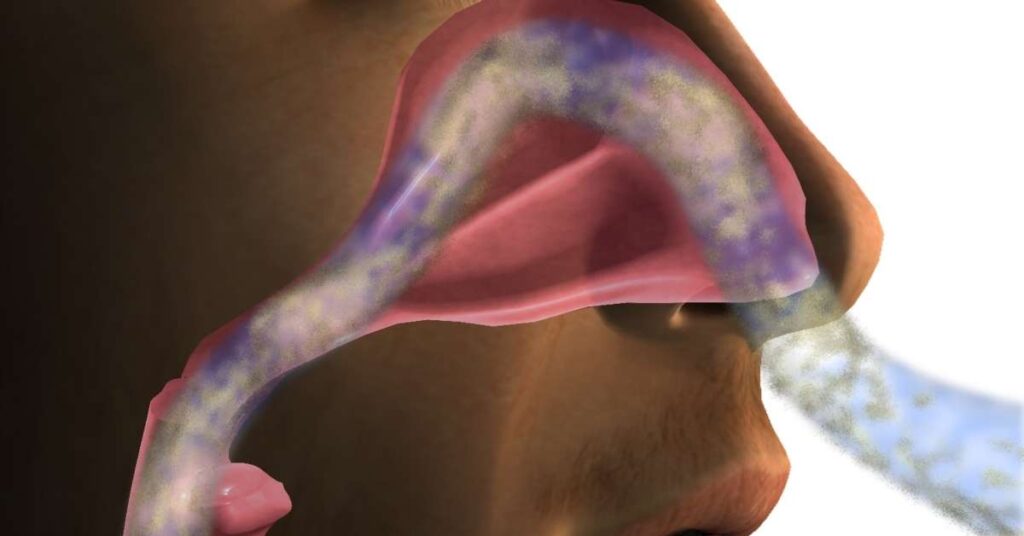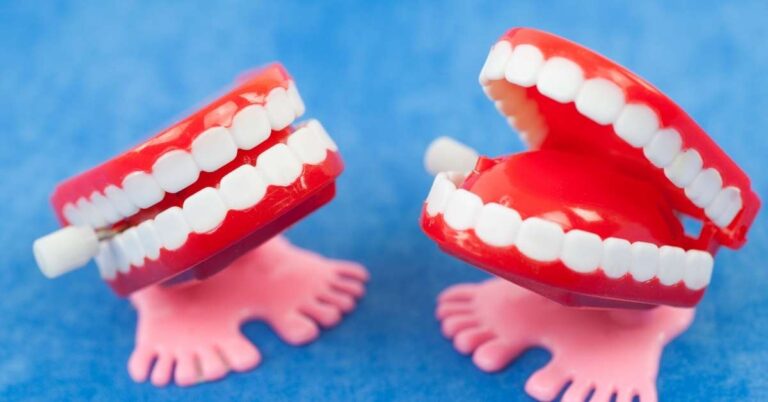Is Mewing When Sick Possible?
When you first discover how mewing works and what it can do for your face, it’s like a lightbulb goes off. Something so simple, that’s good for your health and your appearance? Of course you want to do it ALL. THE. TIME. But can you do it all the time? What about when you’re sick?
You can usually mew while you are sick. In fact, breathing through your nose might help alleviate some of your symptoms. The rule of thumb is that if you can mew comfortably, then it’s safe to do so. That said, letting your body rest and heal is the most important thing, so if you can’t mew comfortably, don’t stress about it.
Got the sniffles, but committed to your mewing gains? Here’s what you need to know.

You Can Mew When You’re Sick
There are some things you absolutely shouldn’t do when you’re sick—like smoke or drink or run a marathon. But whether or not you can mew will largely depend on how you feel.
Remember that mewing is simply about having good tongue posture and breathing through your nose. So there’s nothing mutually exclusive between being sick and mewing.
Related: Where To Place The Tongue When Mewing
That said, if you’re congested and you can’t mew and/or breathe through your nose, then you simply won’t be able to mew. That’s ok, too, because…
You Don’t Have To Mew When You’re Sick
Mewing is a healthy habit, and if you’re really young (in your teens or early twenties), then you might see results pretty quickly.
But ultimately, you don’t mew for quick results (or at least, quick results aren’t the philosophy behind mewing).
Dr. Mew stresses that bones are more susceptible to long duration forces than you might think. But ‘long’ is the operative word here. If you’re an adult, even if you’re always mewing for the recommended daily hours, you can really only expect between half and one millimeter of growth a year (source).

So what does that mean? Mewing is about the long term effects of good tongue posture. So if you need to take a few days off to relax and recover, that’s fine. Don’t worry about it.
In fact, remember when we talked about the things you shouldn’t do when you’re sick? Getting stressed out would be at the very top of that list. So if you’re stressed about losing any mewing progress, I’m here to tell you it’s ok. Let your body repair itself.
And don’t forget that most bone growth happens at night (source). So if you’re sick, maybe one of the best things you can do for your facial structure is to simply let yourself catch some zzz’s.
Leave The Hard Mewing For When You’re Feeling Better
Going back to the list of things you shouldn’t do when sick, for most people, that will include hard mewing. I’m talking about doing the Max Tongue Press Exercise, tongue chewing, and other activities that are designed to get you more actively working your tongue and jaw muscles.
They might seem simple, but these exercises are effective for the same reasons that other exercises are effective. They require you to actively use your muscles. And so by the same token, if you’re too sick to hit the gym, think about saving your hard mewing for later, too.
Benefits Of Nose Breathing—Even When You’re Sick
Finally, you can’t write about mewing when sick without also talking about how important nasal breathing is when it comes to preventing and treating many illnesses.
I get that not everyone is on board with the whole ‘mewing’ thing, and that’s fine. But everyone (and I mean everyone) should breathe through their nose as much as possible. Nasal breathing can filter out harmful particles, humidify the air you breathe, and help increase your air flow and oxygen uptake. It can even lower your risk of allergies, hay fever, and coughing, while also helping your immune system (source).
Even if you don’t feel up to correcting your tongue posture while sick, do what you can to breathe through your nose. Not only will it help you feel better now, it might help you from getting so sick in the future.

Nasal Breathing When Sick
Nasal breathing is sometimes easier said than done when your nose is stuffy, runny, or completely clogged. If you really can’t breathe through your nose (then again), try not to stress about it. Start breathing through your nose again as soon as you possibly can.
There are also lots of online remedies for curing a stuffy nose, too. A hot shower can help open up your sinuses, and I love a cup of hot tea.
Tip: My favorite herbal teas for when I’m sick are Throat Coat and Breathe Easy tea. Both include a blend of herbs that help alleviate congestion and coat the back of the throat for soothing relief.

Try not to overdo it on the nasal sprays, which can ultimately lead to nasal spray addiction. If you’re extra stuffed at night, you might want to try a nasal strip while you sleep instead. If your stuffy nose is the result of a nasal or sinus infection, this interesting gargling technique might be useful.
More so than tongue posture alone, what Dr. Mew stresses is the importance of the Orthotropic Premise: resting your tongue on your palate with your lips sealed, in order to foster good, healthy facial development. That means nose breathing is intimately linked with mewing.
So even if you’re not mewing while sick, do what you can to keep your nasal passages open so you can keep breathing through them.
Related Posts:
- Mewing While Sleeping: Is It Possible?
- Mewing: How Long Until You See Results?
- Can Mewing Fix A Receding Chin?
- Where To Place The Tongue When Mewing
Related Questions:
Does Mewing Make You Breathe Better?
One of the goals of mewing is to help you breathe better. People also mew to help alleviate breathing conditions like snoring and sleep apnea. Just as important, mewing forces you to breathe through your nose instead of your mouth, which is widely recognized as the ‘better,’ more healthy way to breathe.
Why You Should Stop Mewing?
Obviously, you should stop mewing in the moment if you can’t breathe. Beyond this, when people mew incorrectly or spend too much time hard mewing, it can lead to jaw problems, facial asymmetry, and other concerns. It’s always smart to talk to a dentist or orthodontist about any concerns.
Should Teeth Touch When Mewing?
Your teeth shouldn’t touch when mewing, but they should be very, very close. Dr. Mew calls this the ‘butterfly touch.’ In other words, your teeth want to be so close that they are just barely not touching.
Are There Any Risks In Mewing?
In theory, there are risks to mewing improperly, but most risks are associated with ‘hard mewing,’ which is the practice of mewing so aggressively that it can start to hurt. There can also be risks associated with many of the jaw strengthening exercises commonly associated with mewing.
Should Mewing Be Uncomfortable?
Mewing might feel awkward at first, but it should not be uncomfortable. If you are uncomfortable while mewing, that probably means you are doing it wrong. It could also mean that you are one of a small number of people who don’t have enough space in your throat to accommodate pushing your tongue on the roof of your mouth while still being able to breathe. If this is the case, you should talk to a dentist or orthodontist about your concerns.
Why Does Mewing Cause Me To Salivate?
When you first start mewing, you might feel like you are salivating more, because you notice where saliva pools below your tongue. If you are producing excessive saliva, or if the amount of saliva doesn’t lessen with time, it you could mean that you are mewing improperly and/or placing too much force on your salivary glands.
Is Mewing Good For Your Health?
People generally mew for the health benefits. Part of mewing includes nasal breathing, which is widely viewed as the healthiest way to breathe. Mewing is also touted to help reduce snoring and sleep apnea. Anecdotally, many people report getting sick less often when they start mewing regularly, possibly because of the increase in nose breathing.






